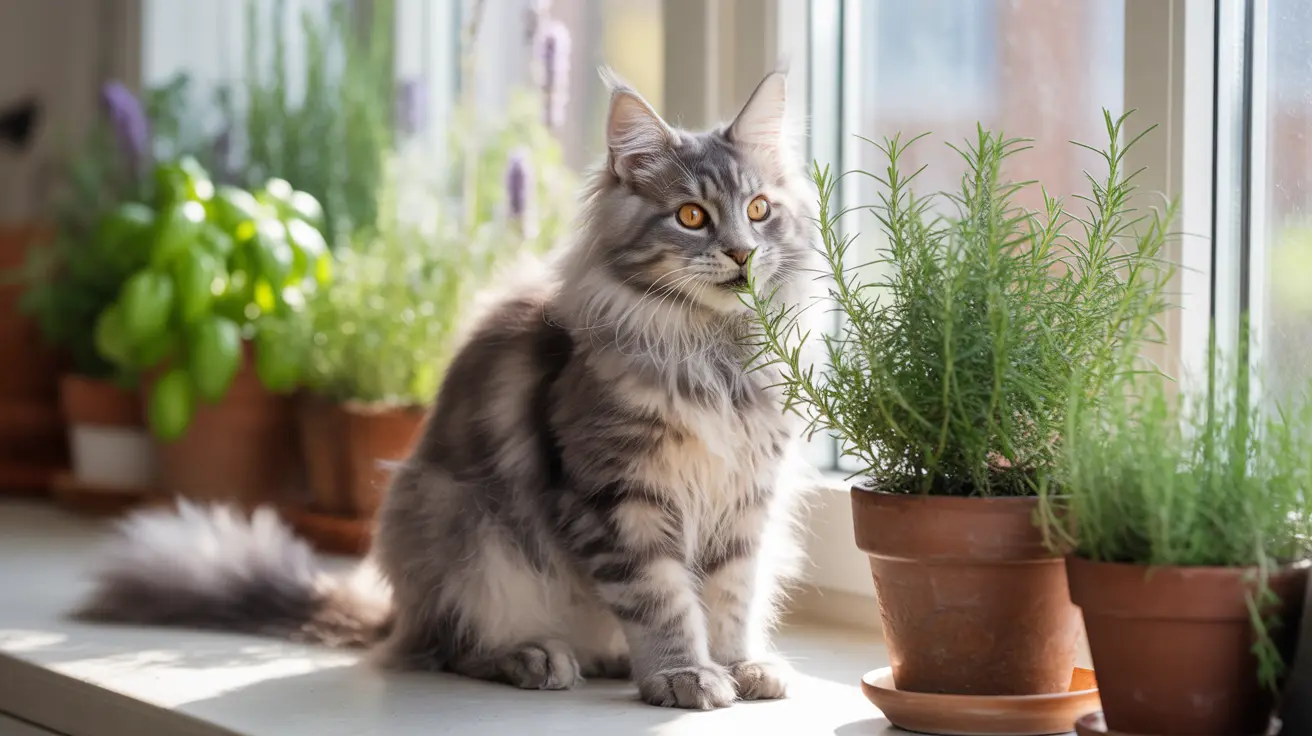Understanding Rosemary and Cats: The Basics
Many cat owners wonder about the safety of common household herbs, particularly rosemary. The good news is that rosemary is generally considered safe for cats when used appropriately. The ASPCA and Pet Poison Helpline both classify rosemary as non-toxic to cats, but there are important distinctions to understand about different forms of this popular herb.
While fresh and dried rosemary are safe in small amounts, certain preparations can pose serious risks to your feline friend. Let's explore everything you need to know about rosemary and cats to keep your pet safe.
Safe Forms of Rosemary for Cats
Fresh and dried rosemary leaves are considered safe for cats in moderation. If your cat nibbles on a rosemary plant or encounters small amounts of dried rosemary in food, there's typically no cause for concern. The FDA has designated rosemary as "Generally Recognized as Safe" (GRAS) for both humans and pets.
Rosemary extract, commonly used as a natural preservative in commercial cat foods, is also safe when properly formulated. This form is specifically processed for pet food use and contains much lower concentrations than essential oils.
When Rosemary Becomes Dangerous
The most significant danger comes from rosemary essential oil, which is highly concentrated and toxic to cats. Cats lack certain liver enzymes necessary to process essential oils effectively, making them particularly vulnerable to oil-based toxicity. Never use rosemary essential oil around cats, whether in diffusers, topical applications, or cleaning products.
Large quantities of even safe forms of rosemary can cause problems. While small amounts are harmless, consuming too much fresh or dried rosemary may lead to digestive upset.
Signs of Rosemary-Related Problems
Watch for these potential symptoms if your cat has consumed too much rosemary or been exposed to essential oils:
- Vomiting or diarrhea
- Lethargy or weakness
- Difficulty breathing
- Excessive drooling
- Tremors or seizures
- Redness in mouth or gums
Safe Usage Guidelines
If you grow rosemary at home, consider these safety measures:
- Place plants in areas your cat can't easily access
- Monitor your cat's interaction with the herb
- Keep essential oils completely out of reach
- Check ingredient labels on pet products
- Use rosemary-containing products only as directed
Frequently Asked Questions
Is fresh or dried rosemary safe for cats to eat, and in what amounts?
Yes, both fresh and dried rosemary are safe for cats in small amounts. While a few nibbles won't harm your cat, large quantities should be avoided as they may cause mild digestive upset.
Why is rosemary essential oil dangerous for cats, and what symptoms should I watch for if my cat is exposed?
Rosemary essential oil is dangerous because cats lack the liver enzymes needed to process concentrated oils. Watch for symptoms like vomiting, difficulty breathing, drooling, lethargy, or seizures. If you notice any of these signs, seek immediate veterinary care.
Can rosemary extract used as a preservative in cat food harm my cat?
No, rosemary extract used as a preservative in commercial cat food is safe. It's specifically formulated at low concentrations and has been approved by regulatory bodies for use in pet food products.
How can I safely use rosemary plants at home if I have cats around?
Keep rosemary plants in areas your cat can't easily access, monitor your cat's interaction with the herb, and ensure they don't consume large quantities. If growing rosemary indoors, consider placing it in a separate room or elevated location.
What should I do if my cat eats a large amount of rosemary or comes into contact with rosemary essential oil?
For large amounts of fresh/dried rosemary, monitor your cat for digestive upset. For essential oil exposure, seek immediate veterinary care as this can be serious. Don't wait for symptoms to develop before contacting your vet.
Conclusion
While rosemary is generally safe for cats in its natural form, responsible use and careful monitoring are essential. Keep essential oils away from your feline friends, and always err on the side of caution when introducing any new herb or plant to your home environment. When in doubt, consult with your veterinarian about any specific concerns regarding rosemary and your cat's health.






